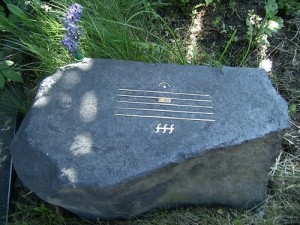
ClassicFM posted a photo of Alfred Schnittke’s gravestone on Facebook today. I wrote a thing about it for Brandon Wilner’s fakemusic.org in 2015. Here is a lightly edited version (doesn’t one’s prose always looks worse in hindsight?)
The Soviet composer Alfred Schnittke lived from 1934 to 1998. He was buried in Moscow; his grave is marked with a simple stone, upon which is inscribed a peculiar marking: a whole rest topped by a fermata, marked fff.
The rest indicates silence, emptiness, the absence of sound. This particular rest is a ‘whole rest’: it indicates a silence for the duration of the full bar. Above the rest sits a fermata, Italian for ‘stop’; it’s shaped like a sideways crescent surrounding a dot. In musical notation, a fermata above a note indicates that the note should be held for an indeterminate length of time. (In an orchestral work, the players would watch the conductor in order to cut off the note together).
Taken altogether then, this notation describes a long silence of indefinite measure: the never-ending sleep of the dead rendered in standard Western musical notation.
There is one additional element though, which stands in a contradiction to the above: the three f’s below the whole rest stand for the Italian fortississimo, very, very strong. This is the loudest dynamic marking regularly used in classical music.
We have at least two possible readings:
- That the absence of Alfred Schnittke leaves an excruciatingly loud silence in our world; the loss of his music is a painful maw.
- In spite of his corporeal disintegration, his spirit remains ever present, roaring, and emphatic through his music.
Because this musical marking indicates a ceaseless stream of silence, and because Alfred Schnittke cannot return to the realm of the living (though he did this very thing following his third stroke), Fake Music chooses not to reissue the work so as not to define the parameters of his—or his music’s—rest.